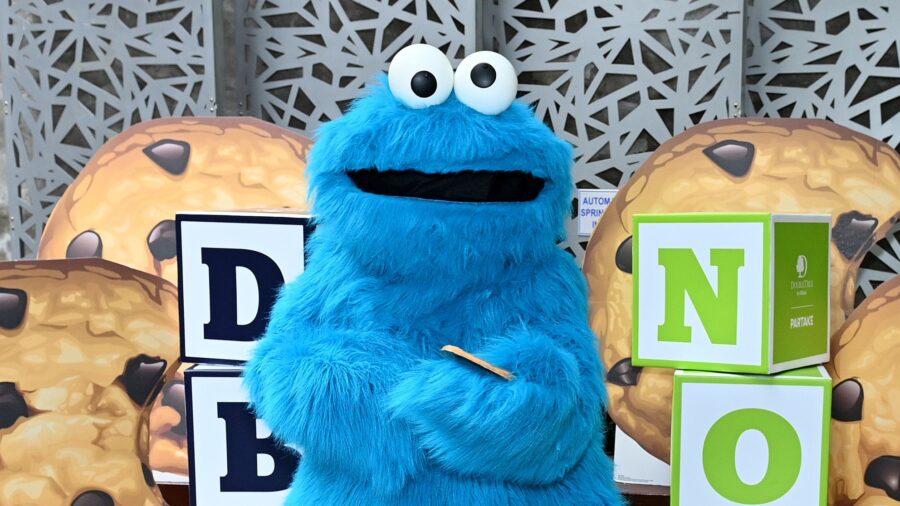Even Cookie Monster is complaining about the US economy now
Mar 4, 2024, 3:05 PM

Cookie Monster has taken to X to express his frustration over shrinking products, aka: "shrinkflation." (Roy Rochlin, Getty Images)
(Roy Rochlin, Getty Images)
(CNN) — Cookie Monster has taken a stance on a very real and controversial trend in the US economy — and he hates it.
The gluttonous blue Sesame Street character known for gorging on cookies expressed his dismay at “shrinkflation” Monday in a post on X. Cookie Monster is apparently feeling the pain of high prices and an elevated cost of living, which have led to, among other things, the downsizing of certain consumer goods without an accompanying drop in their price.
“Me hate shrinkflation! Me cookies are getting smaller,” Cookie Monster wrote. “Guess me going to have to eat double da cookies!”
He may be right.
OREO Double Stuf Chocolate Sandwich Cookies saw a 6% decrease in size by weight from January 2019 to October 2023, according to a report from Democratic Sen. Bob Casey in December, using Labor Department data.
Products have decreased in size
His report also showed that goods ranging from cleaning products, coffee and candies to sugar and frozen foods decreased in size last year, with household paper products experiencing the most shrinkflation.
“Household paper products, like toilet paper and paper towels, are 34.9 percent more expensive per unit than they were in January 2019. Of that total cost increase, 10.3 percent is due to producers shrinking the size of rolls and packages,” the report said.
It’s not a new phenomenon: During times of high inflation, companies increasingly prefer to reduce the size of their products rather than to hike the price, as a way to cut costs. Research indicates that consumers are more sensitive to when prices change than they are to when products become smaller.
But, as inflation has slowed recently, the question as to whether companies are downsizing to boost profits (which some call “greedflation,”) or due to higher input costs, has become debatable.
Democratic Sen. Sherrod Brown of Ohio chimed in on Cookie Monster’s post, saying “big corporations shrink the size of their products without shrinking their prices, all to pay for CEO bonuses.”
“People in my state of Ohio are fed up — they should get all the cookie they pay for,” he added.
The challenge of ‘shrinkflation’ to be addressed
President Joe Biden is set to deliver his annual State of the Union address to Congress on Thursday, and shrinkflation could be one of the challenges he addresses, according to media reports.
Last month, Biden lambasted shrinkflation ahead of the Super Bowl match, calling on companies to “put a stop to this.”
“The American public is tired of being played for suckers,” Biden said in a video posted on X ahead of the game, which is typically an occasion in which Americans stock up on snacks such as chips and soda.
Casey introduced a bill last week that “empowers Federal Trade Commission and state attorneys general to crack down on corporations reducing product size without a reduction in price.”
Meanwhile, while the rate of price increases has slowed dramatically since reaching a four-decade high in the summer of 2022, the level of prices remains above anything Americans dealt with in pre-pandemic times.
Recent economic data has some on Wall Street fearing that underlying inflationary pressures could prove to be more stubborn than previously thought.
The latest Consumer Price Index showed that inflation didn’t ease in January as much as Wall Street was expecting. That resulted in a brief selloff that week. Then the Fed’s preferred inflation gauge — the Personal Consumption Expenditures price index — similarly showed that some price pressures didn’t slow as much as in prior months. In fact, prices rose from December to January at the fastest clip in months.
Interest rates won’t be cut anytime soon
That all means Fed officials, who are tasked with stabilizing prices, likely won’t cut interest rates anytime soon — so higher prices could be here to stay just a little bit longer. The central bank raised its benchmark lending rate 11 times since March 2022 in an effort to tamp down rising prices by reducing overall demand, but the economy has largely resisted those efforts.
Americans’ attitudes toward the economy have improved recently, thanks to slowing inflation, according to consumer surveys, but remain below levels seen before the Covid-19 pandemic.
Fed Chair Jerome Powell has said Americans “hate” inflation, which has been reflected clearly in surveys and polls.
Powell testifies before congressional lawmakers this week to deliver a semiannual report on the central bank’s policies over the past several months, and the Fed chief could give markets — and cookie consumers — some idea of what to expect in the months ahead.













